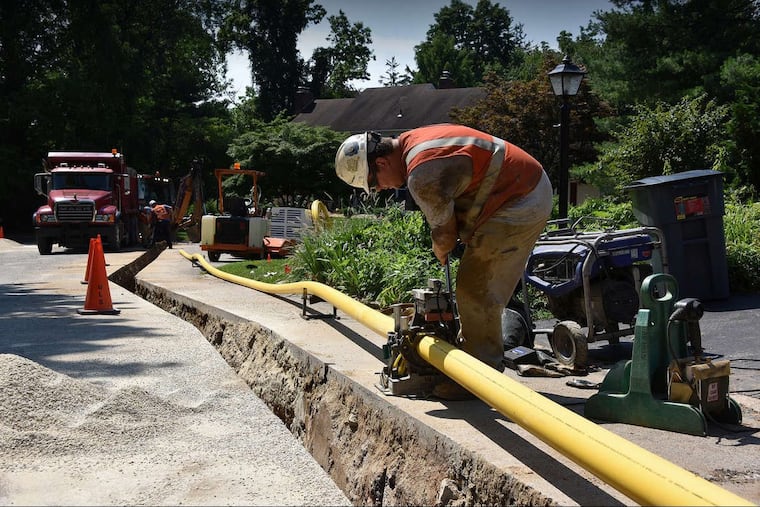Peco seeks 9% rate increase for natural gas customers
The Philadelphia utility, which serves about 540,000 gas customers in the suburbs, said the rate increase was its first in 10 years.

Peco on Wednesday filed for a rate increase that would boost bills for its natural gas customers by 9%, or about $7 a month for a residential customer.
The Philadelphia utility, which serves about 540,000 gas customers in the suburbs, said the rate increase was its first in 10 years. If approved by the Pennsylvania Public Utility Commission, customers would still be paying about 11% less than a decade ago because the price of natural gas has fallen.
“We’re fortunate that customers' gas bills have remain reasonable due to commodity prices,” Richard G. Webster Jr., Peco’s vice president of regulatory policy and strategy, said in an interview. “In fact, even with this increase, customers' bills will be lower than they were 10 years ago.”
Webster said that Peco delayed the rate filing for six months because of the COVID-19 pandemic, pushing back the date when it would go into effect to next July 1. That means the first substantial impact on bills would happen during the 2021-22 heating season, a year from now.
The rate increase would generate about $69 million more a year in revenue.
Peco said it needed the increase to pay for higher operating and maintenance costs, to help pay for the $2.5 billion in capital investments in its gas distribution system in the last decade, and to expand energy-efficiency subsidies for residential, low-income, and small-business customers.
Peco said that bills for small-business customers would also increase about 9%, or about $31 a month.
“We recognize that the effects from the COVID-19 pandemic are far from over,” Peco president Mike Innocenzo said in a statement. “However, these necessary and strategic investments will enhance the safety and reliability of our natural gas infrastructure and will help our customers save energy and money in the long run.”
Utility rate increase requests, which go through an elaborate nine-month PUC review, are examined microscopically by the commission’s staff and advocates for competing customer classes, including the Office of Consumer Advocate and the Office of Small Business Advocate. Typically the parties negotiate a settlement that then goes before the PUC for approval.
At Peco’s last gas-rate increase, in 2010, the utility requested a $43.8 million boost and settled for $20 million.
Rate increases apply only to the charge Peco assesses for delivering energy, which are listed on its bill as gas delivery charges. The cost for energy, the gas supply charges, are subject to regular adjustments to reflect the rise and fall of commodity markets.
Under its proposal, Peco would increase the amount it charges per unit of natural gas customer consume. It would also increase the monthly fixed customer charge for residential service from $11.75 to $16, continuing a trend among public utilities to stabilize their income by shifting more revenue to fixed fees rather than the charges based on energy usage. The amount of gas used by individual households has been in long-term decline as customers adopt more energy-efficient appliances.
Peco said its proposal also includes spending about $5 million more a year for customer programs to promote energy efficiency: $3.5 million in rebates for high-efficiency furnaces, boilers and water heater systems; $1 million to upgrade heating systems for low-income customers; and a $500,000 program to reduce bills by $500 for small businesses demonstrating a financial hardship.